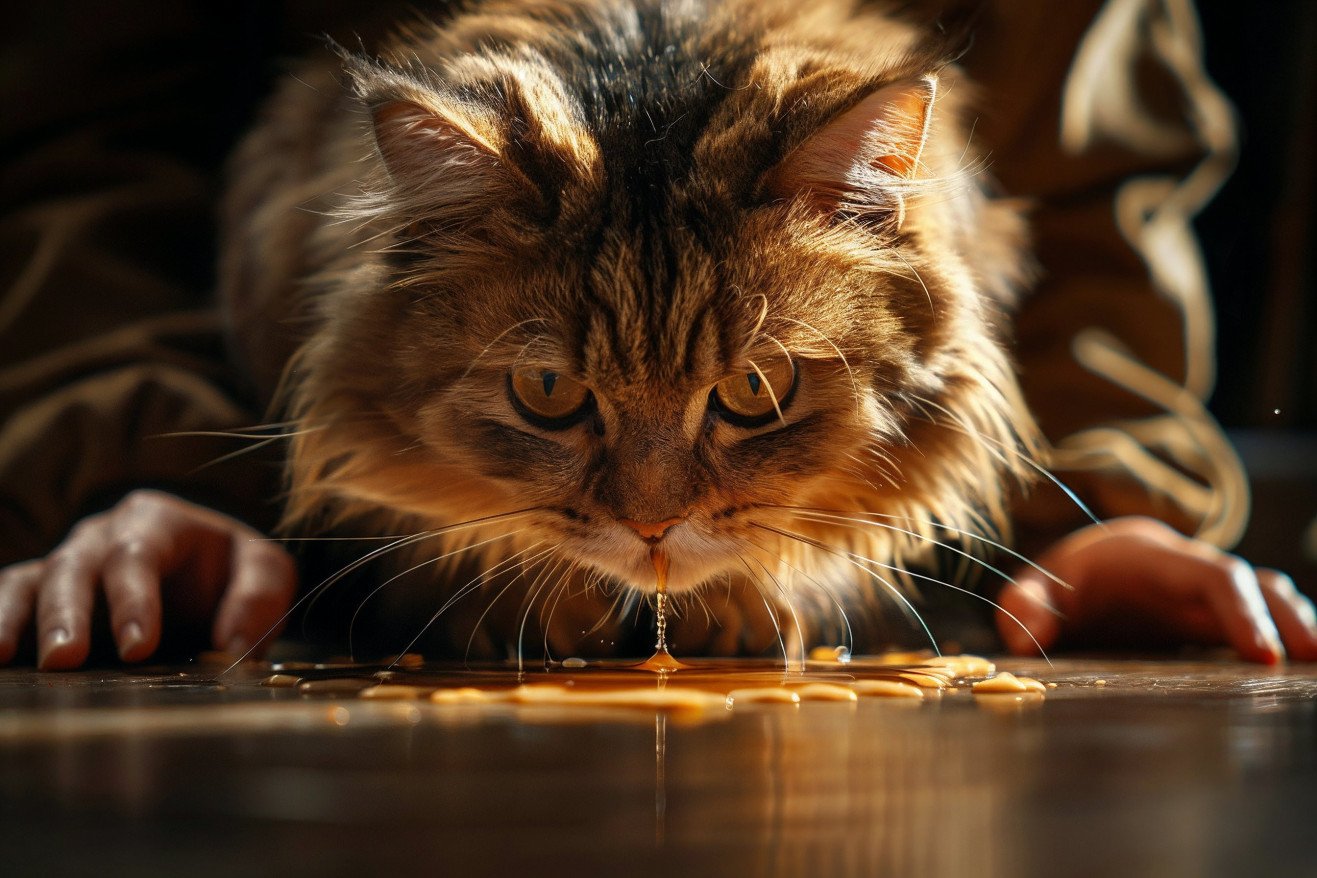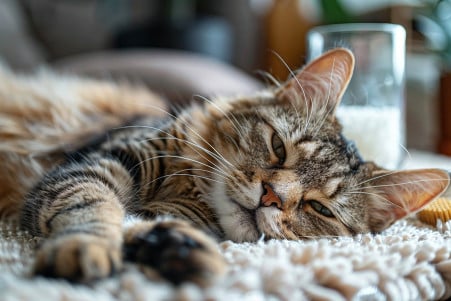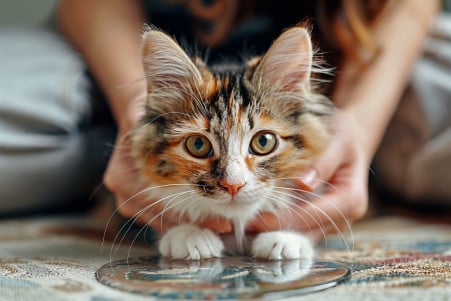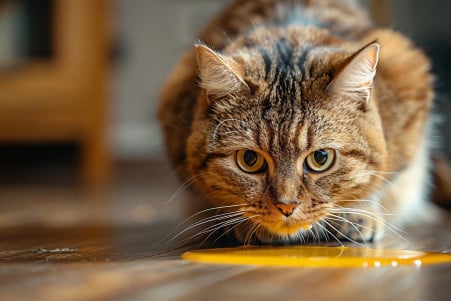Why Is My Cat Throwing Up Brown Liquid? A Vet's Guide
2 May 2024 • Updated 1 May 2024

If your cat is throwing up brown liquid, you may be wondering what's causing it and what you can do to help. Bile vomiting is the most common reason for cats throwing up brown liquid, and it can be a symptom of a few different health issues, including inflammatory bowel disease, intestinal obstruction, and pancreatitis. While bile vomiting may not always be a cause for concern, if it happens repeatedly or your cat is showing other signs of sickness, you should keep an eye on them and talk to your vet.
To help you get a better idea of what might be going on, this article will review research on cat health, including digestive issues and common cat health problems, and include insights from veterinarians who specialize in cat care. By learning more about the science of bile vomiting, you can make sure that you're prepared to spot potential problems and take the right steps to help your cat stay healthy.
Why is my cat throwing up brown liquid?
What Causes Cats to Vomit Brown Liquid?
There are many potential reasons why a cat might vomit brown liquid. One of the most common is that hairballs or other indigestible items have irritated the lining of the digestive tract, leading to the expulsion of brown liquid, according to PetGuide. Meanwhile, food allergies, a sudden change in diet, or eating too fast can all cause stomach upset and lead to the vomiting of brown bile, according to Purina.
Gastrointestinal issues are another common cause. Inflammatory bowel disease, intestinal obstructions, and pancreatitis can all cause brown liquid to be vomited up, according to Sploot Vets. Meanwhile, liver disease, kidney disease, and other organ issues can cause bile reflux, which can lead to the vomiting of brown liquid, according to the same source.
In more serious cases, internal bleeding due to ulcers, cancer, and other serious issues can cause the vomiting of partially digested blood, which can look like a dark brown or black liquid, according to Purina. While this can be very scary, knowing these potential causes can help cat owners better understand their pet's symptoms and know when to seek help from a vet. Gastrointestinal issues are often to blame for cats vomiting brown liquid, but the severity of the issue can vary from mild to life-threatening.
When to Take Your Cat to the Vet for Vomiting
So, when should you take your cat to the vet for vomiting? According to VMBS News, if the vomiting is occasional and not accompanied by any other symptoms, it may not be a cause for concern. However, if the vomiting is frequent, the amount of vomit is large, or if there is blood in the vomit, you should take your cat to the vet. Other symptoms, such as a lack of energy, a lack of appetite, or signs of pain, are also reasons to take your cat to the vet.
There is no specific frequency that is considered 'normal' - more than a couple times per month could indicate an issue, says Vet Help Direct. Vets can run tests to determine the cause of the vomiting and then treat the issue accordingly, whether that means a change in diet or something more serious.
At-Home Treatment and Home Remedies for Cat Vomiting
If your cat is only vomiting occasionally and the episodes are mild, you can try withholding food for 12-24 hours and then offering small amounts of water, says VCA Animal Hospitals. You can also try feeding your cat a bland diet of boiled chicken, rice, or a prescription diet to help the stomach feel better, according to Joii Pet Care.
In some cases, natural remedies like ginger tea, petroleum jelly for hairballs, and probiotics can help, says Catster. However, it's important to note that you should only try at-home treatment if your cat is eating and drinking and otherwise acting normally, says Joii Pet Care. Continuing to treat your cat at home if their condition worsens can lead to dehydration and other issues.
Prevention of Vomiting in Cats
Slowly introducing new foods and making gradual dietary changes can help prevent vomiting due to dietary causes, according to The Cat Doctor Atlanta. Keeping cats away from potential toxins, plants, and foreign objects can help prevent poisoning, as mentioned by RexiPets. Regular grooming and the use of hairball products can help prevent vomiting due to hairballs, according to the same article.
Feeding smaller, more frequent meals can help prevent overeating and vomiting, according to VCA Animal Hospitals. A stress-free environment and the use of pheromone products can help prevent stress-related vomiting, according to PetMD. Although some causes of vomiting can't be prevented, these prevention strategies can help many cats experience fewer and less severe episodes.
Veterinary Diagnostics and Treatment for Chronic Vomiting
If at-home treatments don't help your cat's vomiting, veterinarians can perform diagnostic tests such as fecal exams, blood tests, and imaging to find the cause, notes PetMD. These tests can reveal infections, organ issues, obstructions, or inflammatory problems that could be leading to chronic vomiting.
The treatment will vary based on the diagnosis, but it may include medications, dietary changes, or in some cases, surgery, according to Puainta. Meanwhile, anti-nausea medications, appetite stimulants, and IV fluids are often used to help manage symptoms during the diagnostic process, says PetMD.
Many of the issues that lead to chronic vomiting in cats can be managed or treated successfully with the right veterinary care and treatment plan, explains IAMS Singapore. However, it's important to make sure you're keeping an eye on your cat's health and working with your vet to make sure they're getting the care they need.
If Your Cat Is Vomiting Brown Liquid: Key Takeaways
If your cat is vomiting brown liquid, it's important to keep a close eye on them, especially if the vomiting is happening frequently. While you may be able to treat your cat at home for mild and occasional cases, chronic vomiting will require a vet's care to determine the cause.
Causes of brown liquid vomit in cats can include hairballs, dietary issues, and more serious gastrointestinal disorders, organ failure, and even internal bleeding. Wagr Petcare lists a number of potential causes, from eating something brown to liver or kidney disease.
The amount and frequency of the vomiting can help you determine how serious it is, as Best Friends Animal Society explains. If your cat is vomiting forcefully or vomiting blood, you should take them to the vet immediately. On the other hand, if your cat is only vomiting occasionally and the amount is small, you may not need to rush them to the vet.
As The Cat Doctor Atlanta and RexiPets point out, there are things you can do to help prevent vomiting, including making sure that you gradually change your cat's diet, managing hairballs, and reducing your cat's stress. However, it's important to note that there are some causes of vomiting that you won't be able to prevent, so it's important to make sure that your vet can diagnose and treat the cause of your cat's vomiting.
Many of the causes of chronic vomiting in cats can be managed or treated effectively with the right care, as IAMS Singapore notes. The key is to make sure that you're keeping an eye out for any signs of trouble and that you're working with your vet to make sure that your cat is as healthy as possible.


